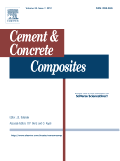
CEMENT & CONCRETE COMPOSITES
Scope & Guideline
Shaping the Landscape of Sustainable Construction Practices
Introduction
Aims and Scopes
- Sustainable Materials Development:
The journal emphasizes the use of sustainable materials in cementitious composites, including the incorporation of industrial by-products and waste materials to reduce environmental impact. - Advanced Characterization Techniques:
Research published in the journal often employs advanced characterization methods such as X-ray CT, NMR, and nanoindentation to investigate the microstructural properties of cementitious materials. - Self-Healing Mechanisms:
A significant focus is placed on the development of self-healing cementitious materials, exploring various biological and chemical techniques to enhance durability and longevity. - Innovative Additives and Modifiers:
The journal covers studies on a wide range of chemical additives and modifiers that enhance the performance of cement-based materials, including superabsorbent polymers and nanomaterials. - Performance Under Extreme Conditions:
Research frequently investigates the performance of cementitious materials under extreme environmental conditions, such as high temperatures, freeze-thaw cycles, and corrosive environments. - 3D Printing and Digital Fabrication:
The journal includes research on the applications of 3D printing technologies in the production of cement-based materials, focusing on rheological properties and structural performance.
Trending and Emerging
- Carbon Capture and Utilization:
Recent studies emphasize the development of cementitious materials that can capture and utilize CO2, reflecting a growing trend towards carbon-neutral construction. - Nanotechnology in Cement Composites:
There is an increasing interest in the application of nanotechnology to enhance the properties of cementitious materials, particularly through nanomaterials to improve mechanical performance and durability. - Bio-Inspired and Biological Approaches:
Research is trending towards bio-inspired materials and biological methods for enhancing self-healing properties in cement-based composites. - Smart and Self-Sensing Materials:
Emerging studies focus on the development of smart cementitious materials that can monitor their own structural health through integrated sensing technologies. - Sustainable Construction Practices:
The journal is increasingly publishing research that aligns with sustainable construction practices, including the use of recycled materials and low-carbon technologies. - Advanced Modeling Techniques:
There is a notable trend towards the application of advanced computational modeling techniques to predict the behavior of cementitious materials under various conditions.
Declining or Waning
- Traditional Portland Cement Research:
There appears to be a waning interest in conventional Portland cement research, with a shift towards alternative binders and sustainable materials. - Conventional Aggregate Studies:
Research focusing solely on traditional aggregates has decreased, as more studies explore recycled and alternative aggregates to enhance sustainability. - Basic Mechanical Properties:
There is less emphasis on basic mechanical property studies of cementitious materials without considering innovative or sustainable enhancements. - Generalized Durability Studies:
Publications that do not incorporate specific applications or advanced materials in durability studies have become less common, as the field moves towards targeted research. - Historical Analysis of Cement Compositions:
Research that solely focuses on historical analyses of cement compositions without addressing modern sustainability challenges has seen a decline.
Similar Journals
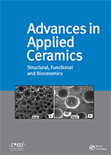
Advances in Applied Ceramics
Exploring the Future of Material SciencesAdvances in Applied Ceramics is a prestigious journal published by SAGE Publications Inc, specializing in the dynamic fields of ceramics and composites, as well as industrial and manufacturing engineering. Established in 2004 and currently holding a notable Q3 ranking in Ceramics and Composites and a Q2 ranking in Industrial and Manufacturing Engineering, this journal is dedicated to disseminating innovative research and practical applications that advance the understanding and functionality of ceramics within various industries. With an impressive impact factor reflecting its academic influence, Advances in Applied Ceramics serves as a vital resource for researchers, professionals, and students alike, offering insights into cutting-edge developments. Accessible through extensive open access options, the journal ensures the broad dissemination of knowledge, fostering collaboration and engagement in the rapidly evolving realm of material sciences. Set in the heart of the United Kingdom, its contributions are recognized globally, placing it at the forefront of academic discourse in its field.
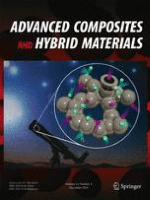
Advanced Composites and Hybrid Materials
Advancing Knowledge in Composite ApplicationsAdvanced Composites and Hybrid Materials, published by SPRINGER NATURE, is a premier journal dedicated to the field of materials science, with a keen focus on innovative composite materials and their applications. With its ISSN 2522-0128 and E-ISSN 2522-0136, the journal has established itself as a cornerstone for researchers and professionals in materials chemistry, ceramics, and polymers, achieving an impressive Q1 ranking across multiple categories in 2023. In particular, it ranks #3 out of 161 in Polymers and Plastics and #4 out of 127 in Ceramics and Composites, highlighting its influential presence within the academic community. The journal aims to provide a cutting-edge platform for the dissemination of groundbreaking research and developments from 2018 to 2024, facilitating knowledge sharing and collaboration among experts. While currently adopting a traditional access model, the significance and impact of research published in this journal cannot be overstated, making it an essential resource for anyone interested in advancing the field of composite materials.
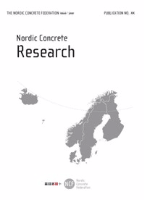
Nordic Concrete Research
Pioneering Insights in Concrete Science and EngineeringNordic Concrete Research is a prestigious journal dedicated to advancing the field of concrete technology and engineering, published by SCIENDO. With an ISSN of 0800-6377 and an E-ISSN of 2545-2819, this journal provides a robust platform for scholars, researchers, and industry professionals to share innovative research findings and insights related to concrete materials, practices, and applications. Since becoming an Open Access publication in 2018, it has enhanced accessibility for global readers, promoting wider dissemination of knowledge and collaboration across disciplines. The journal's commitment to excellence in scholarly communication is evident as it invites contributions that address both fundamental and applied aspects of concrete science, supporting the continuous evolution of this essential material in sustainable construction practices. Situated in Warsaw, Poland, Nordic Concrete Research not only serves the Nordic region but also aims to impact the international concrete community.

ZKG INTERNATIONAL
Elevating Standards in Construction EngineeringZKG INTERNATIONAL is a reputable academic journal dedicated to advancing research in the fields of construction and material engineering, specifically focusing on the cement and concrete industries. Published by BAUVERLAG BV GMBH, this journal serves as a vital platform for researchers, engineers, and industry professionals to share innovative findings, methodologies, and practical applications. While it does not currently operate under an open access model, ZKG INTERNATIONAL maintains a robust subscription base, ensuring wide dissemination of critical insights within the academic and professional communities. The journal also fosters a commitment to high-quality standards, reflected in its efforts to publish comprehensive reviews, original research articles, and case studies that contribute to the evolution of modern construction practices. Its ISSN 2366-1313 stands as a testament to its credibility and the importance placed on advancing the scientific discourse surrounding cementitious materials.
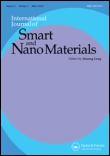
International Journal of Smart and Nano Materials
Pioneering Research in Sustainable EngineeringThe International Journal of Smart and Nano Materials is a leading peer-reviewed publication in the fields of civil and structural engineering, mechanics of materials, and materials science, published by Taylor & Francis Ltd. With its notable Open Access format since 2010, this journal aims to disseminate innovative research and advancements in smart materials and nano technologies, which are crucial for the development of sustainable and efficient engineering solutions. The journal has established a strong reputation, being classified in the Q1 category for Civil and Structural Engineering and Mechanics of Materials, and ranked highly in Scopus with impressive percentiles, illustrating its impact within the academic community. Covering research from 2010 to 2024, it serves as an essential resource for researchers, professionals, and students seeking to stay at the forefront of material innovation and engineering prowess. Current access options facilitate the broad distribution of knowledge, reflecting the journal's commitment to advancing scientific inquiry and application in an increasingly nanotechnology-driven world.
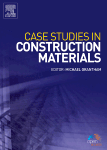
Case Studies in Construction Materials
Advancing Innovations in Construction MaterialsCase Studies in Construction Materials, an esteemed journal published by Elsevier, provides a vital platform for the dissemination of scholarly research in the field of materials science, focusing particularly on innovations and advancements in construction materials. With its Q1 ranking in the 2023 Scopus category of Materials Science (Miscellaneous), the journal stands out for its high-impact contributions and commitment to enhancing industry practices. Open Access since 2014, Case Studies in Construction Materials promotes wide accessibility and engagement, encouraging collaborations among researchers, professionals, and students globally. Whether delving into innovative methodologies, sustainability in construction materials, or case studies that exemplify best practices, this journal is crucial for those seeking to advance the science and application of construction materials. Located in Amsterdam, Netherlands, its robust publication history from 2014 to 2024 ensures it remains a leading resource for contemporary research and academic exploration.
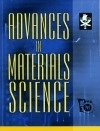
Advances in Materials Science
Connecting Researchers to Revolutionize Materials ScienceAdvances in Materials Science, published by SCIENDO, is a pivotal journal in the field of materials science that focuses on the latest developments and breakthroughs in the study and application of innovative materials. With a commitment to advancing knowledge across various sub-disciplines, this journal provides a platform for researchers, professionals, and students to share their findings, explore new methodologies, and discuss the implications of materials science on technology and industry. The journal, indexed under the ISSN 2083-4799 and E-ISSN 2083-4799, promotes open dissemination of research, encouraging a collaborative approach to problem-solving across disciplines. Its emphasis on high-quality, peer-reviewed articles positions it as an influential resource within the academic community, driving forward the boundaries of what is possible in materials science. Advances in Materials Science continues to be an essential read for anyone dedicated to understanding and innovating in the materials domain.

ACI MATERIALS JOURNAL
Connecting Theory and Practice in Concrete InnovationWelcome to the ACI Materials Journal, a premier publication in the field of materials science and engineering, published by the American Concrete Institute. Since its inception in 1987, this journal has continually contributed to advancing the understanding of concrete materials and structures, playing a vital role in both academic and practical applications. With an impressive impact factor and consistently ranking in the Q1 category for Building and Construction and Civil and Structural Engineering, the ACI Materials Journal is recognized for its rigorous peer-review process and high-quality research contributions. It serves as a crucial platform for researchers, practitioners, and students, featuring articles that explore innovative materials, sustainable practices, and cutting-edge technology, all of which are essential for the future of the civil engineering domain. Although the journal is not open access, it remains accessible to a vast audience through institutional subscriptions.

Innovative Infrastructure Solutions
Empowering Tomorrow's Infrastructure Innovations.Innovative Infrastructure Solutions is a leading academic journal published by Springer International Publishing AG, focusing on pioneering advancements in the fields of building and construction, civil and structural engineering, and environmental engineering. With an impact factor that reflects its significant role in the academic community, this journal serves as a vital platform for researchers, professionals, and students to disseminate groundbreaking studies and novel methodologies spanning diverse engineering disciplines. Since its inception in 2016, Innovative Infrastructure Solutions has steadily positioned itself within the Q2 category across several fields, including geotechnical engineering and engineering geology, as recognized in the 2023 quartiles. This reputable journal, accessible from Switzerland, not only emphasizes collaboration and knowledge exchange but also empowers innovators in infrastructure development globally. Whether you're contributing to a research project or seeking the latest findings, Innovative Infrastructure Solutions remains essential for anyone invested in advancing sustainable infrastructure solutions.
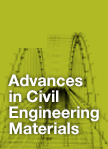
Advances in Civil Engineering Materials
Transforming Infrastructure Through Advanced MaterialsAdvances in Civil Engineering Materials, published by the American Society for Testing and Materials, is a leading journal in the field of civil engineering, specializing in the innovative applications and developments of materials used in construction and infrastructure. With an ISSN of 2379-1357 and an impressive lineup of contributions from renowned researchers, this journal serves as a pivotal platform for disseminating groundbreaking research from 2012 to 2024, currently enjoying a category quartile ranking of Q2 across multiple disciplines including Ceramics and Composites, Civil and Structural Engineering, and Materials Chemistry. Though it operates under a subscription model, the valuable insights and advancements presented in the journal have a significant impact on both academia and industry practices. Researchers, professionals, and students are invited to explore the evolving landscape of civil engineering materials, gaining critical knowledge to drive innovations and contribute to the sustainability and safety of architectural endeavors.